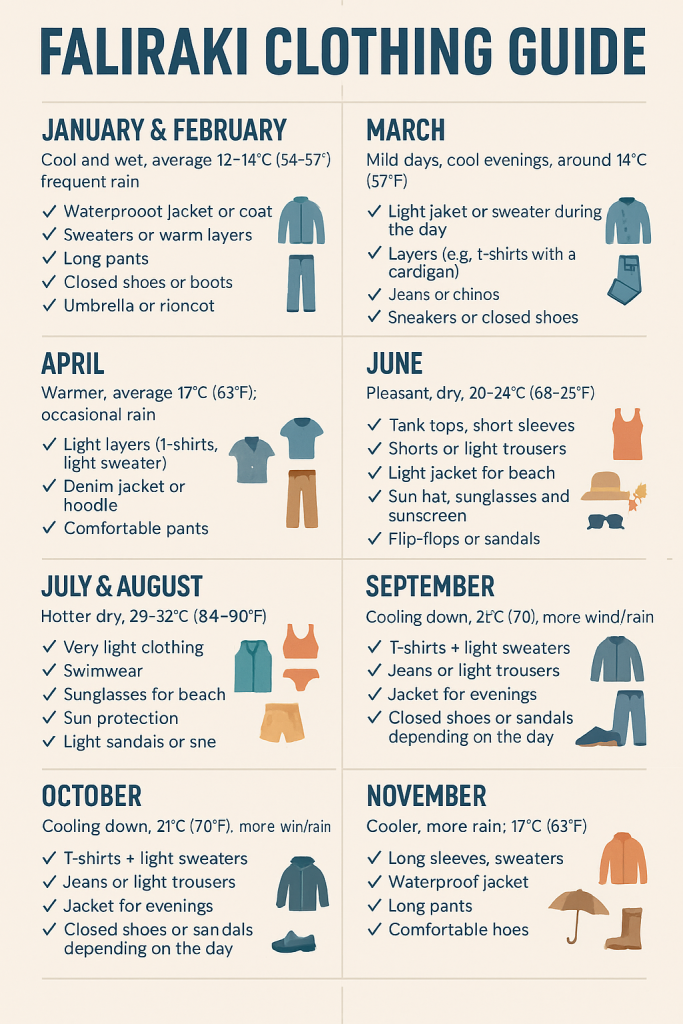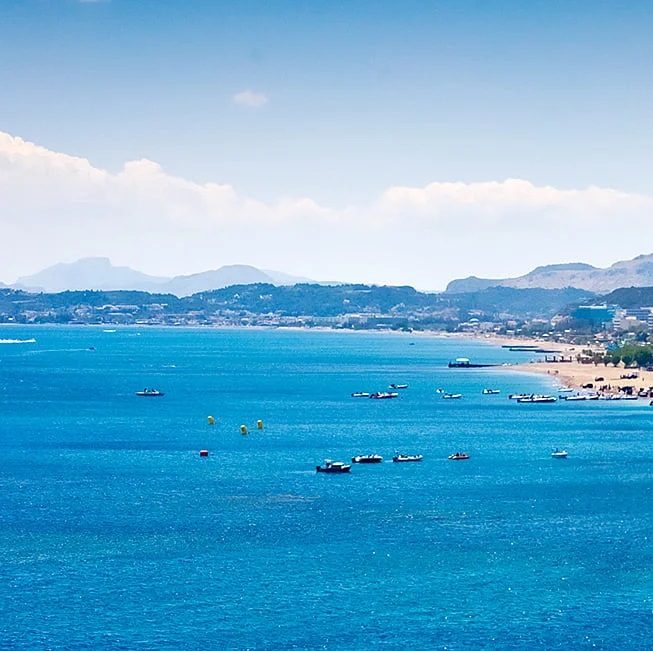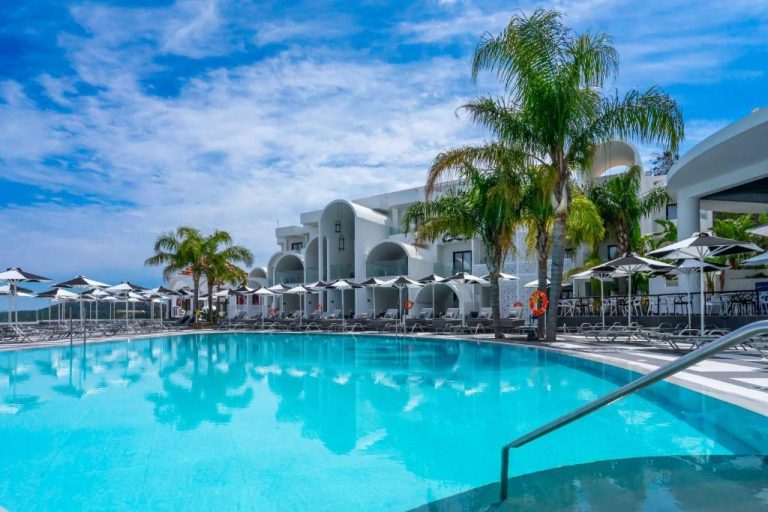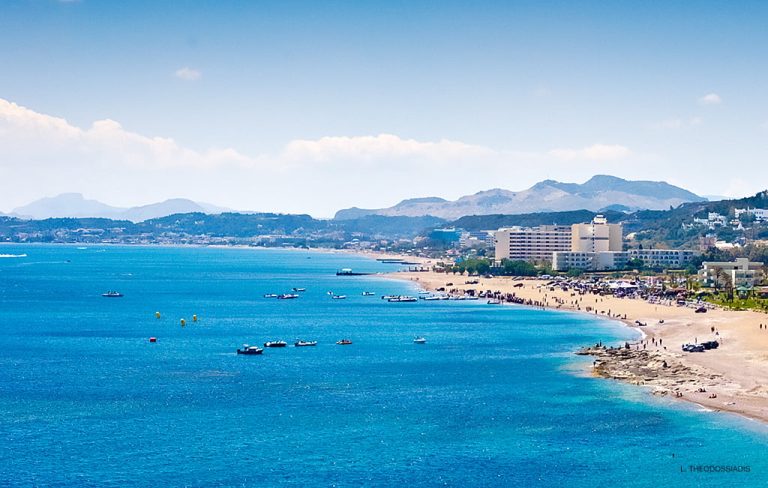
Faliraki, situated on the northeastern coast of Rhodes, Greece, enjoys a Mediterranean climate characterized by hot, dry summers and mild, wetter winters. Here’s a comprehensive overview of its weather patterns:
Seasonal Weather Overview
Summer (June–August):
Temperatures: Average highs range from 29°C to 31°C (84°F to 88°F), with July and August being the hottest months.
Rainfall: Minimal to no rainfall, with July and August often recording no precipitation.
Humidity: Relatively low, averaging between 50% and 60%, making the heat more tolerable.
Winds: The Meltemi winds, blowing from the north/northeast, provide a cooling effect but can be strong at times.
Autumn (September–November):
Temperatures: Gradual cooling with September averaging 24°C (75°F), October around 21°C (70°F), and November about 17°C (63°F).
Rainfall: Increase in precipitation, especially in November, signaling the onset of the wetter season.
Holiday Weather
Winter (December–February):
Temperatures: Mild, with December averaging 14°C (57°F) and January and February around 12°C (54°F).
Rainfall: Peak rainfall occurs in December and January, with averages close to 150 mm per month.
Humidity: Higher relative humidity, averaging around 70%.
Holiday Weather
Spring (March–May):
Temperatures: Warming trend with March at 14°C (57°F), April at 17°C (63°F), and May reaching 20°C (68°F).
Rainfall: Decreasing precipitation as the season progresses, leading into the dry summer months.
Sea Temperatures
The Mediterranean Sea around Faliraki remains warm for much of the year:
Summer Peaks: August sees the highest average sea temperature at approximately 27.7°C (81.9°F).
Winter Lows: February records the lowest average sea temperature around 16.7°C (62.1°F).
Wind Patterns
Faliraki experiences the Meltemi winds, particularly during summer months:
Direction: Primarily from the north/northeast.
These winds can provide a refreshing break from the heat but may occasionally be strong enough to affect outdoor activities.
Monthly Averages Snapshot
Month Avg Temp (°C) Avg High (°C) Avg Low (°C) Avg Rainfall (mm)
January 12 14 10 150
February 12 14 10 150
March 14 16 12 100
April 17 19 15 50
May 20 22 18 20
June 24 26 22 5
July 26 28 24 0
August 27 29 25 0
September 24 26 22 10
October 21 23 19 60
November 17 19 15 100
December 14 16 12 150
Note: The above values are approximate averages.
Faliraki’s climate offers warm, sunny summers ideal for beach activities, and mild winters that are relatively wetter. The transitional seasons of spring and autumn provide pleasant temperatures with moderate rainfall, making it a year-round destination depending on your weather preferences.

January & February (Winter)
Weather: Cool and wet, average 12–14°C (54–57°F); frequent rain.
What to Wear:
Waterproof jacket or coat
Sweaters or warm layers
Long pants
Closed shoes or boots
Umbrella or raincoat
March (Early Spring)
Weather: Mild days, cool evenings; around 14°C (57°F)
What to Wear:
Light jacket or sweater during the day
Layers (e.g., t-shirts with a cardigan)
Jeans or chinos
Sneakers or closed shoes
April (Spring)
Weather: Warmer, average 17°C (63°F); occasional rain
What to Wear:
Light layers (t-shirts, light sweater)
Denim jacket or hoodie
Comfortable pants
Optional: light scarf for evenings
May (Late Spring)
Weather: Pleasant, dry, 20–24°C (68–75°F)
What to Wear:
T-shirts and short sleeves
Shorts or light trousers
Light jacket for evenings
Sandals or sneakers
June (Early Summer)
Weather: Hotter, 24–28°C (75–82°F)
What to Wear:
Tank tops, shorts, and dresses
Swimwear for the beach
Sun hat, sunglasses, and sunscreen
Flip-flops or sandals
July & August (Peak Summer)
Weather: Hot and dry, 29–32°C (84–90°F)
What to Wear:
Very light clothing – cotton or linen
Swimwear all day long if you’re by the sea
Sunglasses, wide-brim hat, sun protection
Light sandals or flip-flops
No need for layers – even evenings are warm
September (Late Summer)
Weather: Still hot, 26–28°C (79–82°F)
What to Wear:
Same as July & August
Maybe a light jacket or shawl for evening breezes
October (Early Autumn)
Weather: Cooling down, 21°C (70°F), more wind/rain
What to Wear:
T-shirts and light sweaters
Jeans or light trousers
Jacket for evenings
Closed shoes or sandals depending on the day
November (Autumn)
Weather: Cooler, more rain; 17°C (63°F)
What to Wear:
Long sleeves, sweaters
Waterproof jacket
Long pants
Comfortable shoes
December (winter)
Weather: Similar to January; average 14°C (57°F)
What to Wear:
Warm jacket
Layered clothing
Rain protection – umbrella or waterproof coat
Boots or warm closed shoes




